Technical:
How can the internationalization of oil and gas talent accelerate the global energy transformation
As the energy transition opens the door to new occupations and new countries for workers in the traditional energy sector, we are witnessing the accelerated shift to renewable energy.
The Airswift's recently released 2022 Global Energy Talent Index found that 86% of energy professionals will consider moving overseas over the next three years, and that more than four-fifths will consider moving to other energy sectors, with renewable energy as the most popular option.
This is reflected in the booming renewable energy sector, with 40% reporting a pay increase in the past year and 21% joining another industry in the past 18 months. Among them, strategic development professional Horkiz Rouzi (Reuters) has successfully moved from a 15-year career in the oil and gas industry in Southeast Asia to a pioneer in the accelerated transition to renewable energy.
Rouzi has helped develop a number of important energy projects in Asia, from Malaysia's oil program to innovative demand response solutions in Southeast Asia, which saves 20% efficiency in electricity consumption across Southeast Asia. Her career is characterized by innovative, forward-looking solutions, including the hiring of former military personnel to change the local oil and gas industry leadership.
However, Rouz has a lifelong passion for sustainable development, rooted in the healthy food and lifestyle of her hometown, and longing for new challenges. This prompted her to move from Asia's fossil fuel industry to the booming clean energy industry in the United States.
She has worked with Airswift to help her transition to renewable energy, which specializes in the seamless transfer of skilled workers across sectors. The skill synergy between oil, gas, and renewable energy has helped her quickly transform herself to lead pioneering projects ranging from green fuels to offshore wind farms that will power 10 million US homes by 2030.

Rouzi noted: " Engineering and leadership are the most popular skills in renewable energy, which are seen everywhere in the experienced oil and gas industry. Other overlapping skills include stakeholder engagement and strategy execution to soft skills such as social and emotional intelligence.
"This opens the door for professionals in other traditional industries such as construction, offshore engineering and maritime affairs. The renewable energy sector is attractive to any innovator because it is a young, recurring industry that you have to learn and do; for example, we have not sold any offshore wind power yet, so it will involve breaking new ground."As a mid-career professional from the mature energy industry, Ruzz can bring valuable experience to this young, rapidly growing but lacking leadership industry. Her unique experience in the traditional energy and new energy fields also puts her in a great position to discover opportunities for renewable energy innovation. For example, her experience with the oil giant's booming waste-to-fuel program has inspired her to advise on a biomaterials company that uses grass for biopackaging to harvest products that produce biofuels. She soon discovered that the execution project development skills she had learned in offshore oil and gas were also closely related to the skills needed for technologies such as offshore wind power.
News:
Car giants compete for the electric car market
Many automakers around the world are investing heavily in electric vehicles (EV) because they see the future of road traffic is electric. As electric car sales grow, carmakers in Asia, Europe and the United States are racing to become the dominant force in electric car manufacturing and sales, with each company hoping to dominate the market by 2020. This month, Volkswagen CEO Herbertdeis said of the electric car market: " The outlook is very good and our orders in Asia are very good."This is in response to concerns about continued delays in supply chains, meaning consumers need to wait longer to buy electric cars.
The disruptions from the COVID-19 pandemic and other factors mean carmakers have having access to specific auto parts such as semiconductors, although Diess believes things will improve in the coming months. Volkswagen Motor Co. (Volkswagen) has increased production in recent months to cope with a backlog of electric vehicle deliveries, with five new assembly plants opening. Diess highlighted the growing demand for electric vehicles in Asia, Europe and the United States, and hinted that delivery times will improve later this year as production increases, and expects semiconductors to become more accessible. With ground breaking this month on Salzsky, a new battery factory in Salzket, Germany, Volkswagen announced a $20.38 billion investment in its battery business through its PowerCo subsidiary. The company expects to create 20,000 jobs, and expects annual sales to exceed $20 billion by 2020. As Europe becomes a battery manufacturing center, SalzGiga will provide a blueprint for Volkswagen's five other battery factories in Europe, with the goal of developing a combined capacity of 2,400 gigawatt hours (GWh). That would make it a major competitor to Tesla, an American electric car company, which also has factories in Germany. PowerCo will manage the public's battery production industry and research in several battery-related areas, such as mining and recycling. The division will also explore energy storage systems as renewable energy projects develop more widely. German Chancellor Olaf Scholz) supported the move and said Europe needs to develop the battery and electric car industry."Not long ago, many Germans thought that we could get batteries from Asia. Today, we have a little more understanding. The outbreak and Russia's brutal attack on Ukraine show that relying on global supply chains means huge risks.”

But several Asian carmakers are also investing heavily in electric car production to gain a competitive advantage over Europe. Hyundai Motor has just announced its first electric car plant in South Korea, and it is expected to begin production in 2025. Hyundai Motor has recently announced several new electric car models that are expected to enter the Asian and European Union markets in the coming years. From now and 2025, Hyundai Motor, including Hyundai (Hyundai) and Kia (Kia), will invest about $48.1 billion in South Korea and another $5.5 billion in the United States in the electric vehicle and battery business
Chang Wen-soo (Yin), an analyst at Hyundai Motor Securities, explained: " The
new electric car factory is crucial to the survival of Hyundai Motor because the sale of diesel locomotives is banned in specific markets."Japan is also trying to catch up with the United States, Europe and Chinese markets. In May, Toyota, Japan's largest automaker, launched the electric SUV bZ4X. In 2021, the automaker announced a $35 billion investment to accelerate the pace of its electric car business.
Toyota is offering the car through a subscription program, which means consumers don't have to worry about battery degradation and other maintenance costs. Shinya Kotera, president of Jap
anese subscription service Kinto Corp, said: " We should take the risk of replacement prices, which is a major concern for drivers, and battery degradation."Kotera hopes this will encourage more drivers to choose from electric cars through the subscription service. However, Toyota already faces problems, further hindering Japan's booming electric car market, as it had to recall its first mass-production electric vehicles, less than two months old. In June, Toyota recalled 2,700 electric vehicles with a tire failure, meaning they could come loose. The bZ4X suv, which was originally headed for Europe, the US, Canada and Japan, was recalled after Japanese safety regulators expressed concerns that the wheels fell off during a sharp turn, despite no accidents being reported. Many companies, including Toyota (Toyota), have also found it difficult to develop the electric car market by the government without increasing incentives to consumers. Us companies General Motors, Tesla and Toyota have all demanded increased tax credits after the $7,500 electric car tax credit expires. In recent months, rising electric car production prices have become even more concerned due to supply chain disruptions and rising manufacturing costs.
Despite challenges such as supply chain disruptions, material shortages and rising costs, many automakers around the world are investing heavily in the electric vehicle business, hoping that traditional fuel vehicles will be phased out over the next decade or more.
Service:
US Coast Guard rescued crew of offshore ships with heart attack symptoms
A 52-year-old man was rescued on Thursday from a sea supply ship located about 36 miles southeast of Grand Island, Louisiana.
The New Orleans Coast Guard attendant received a phone call saying that a crew member on the sea supply ship the Warren Thomas was said to have had a heart attack and stroke-like symptoms. On duty instructed the crew of the New Orleans MH-65 Dolphin helicopter to assist.
The helicopter crew arrived at the scene, safely lifted the patient, and transported him to the University of New Orleans Medical Center. The crewmember was last reported in stable condition, the U.S. Coast Guard said.
Equipment:
Eastern Pacific installed its first carbon capture technology on the twin tanker
Eastern Pacific Shipping has signed a final agreement with Rotterdam-based Value Maritime to install carbon capture and filtration systems on MR tankers Pacific Cobalt and Pacific Gold, with the option of equipping three more ships.
The installation of the first system is scheduled to be completed by 2022, and engineering and planning are underway.
The sister ship, built in 2020, carrying 49,700 tons, will be equipped with Value Maritime's Filtree System——, a prefabricated gas purification system that filters sulfur and 99% particulate matter.
The system will include a carbon capture module to charge the CO 2 battery on board. Charged carbon dioxide batteries will be discharged in the port and then used by carbon dioxide customers, such as greenhouses, or injected into a carbon sequestration network.
The discharged battery will be put back to the container for CO2 charging. This "plug and play" approach enables ships to capture 40% of their current CO 2 emissions, and could exceed 90% in the future.
"Working with Value Maritime is an important step in the energy transition of EPS and the industry. Among our existing emissions reduction solutions, carbon capture technologies are missing and today mainly include alternative marine fuels. We believe that carbon capture technology has significant prospects for reducing emissions from existing and future ocean-going vessels, " said Cyril Ducau, East Pacific CEO.
"Coupled with alternative fuels, biofuels and other solutions, carbon capture is a key step in accelerating the shipping industry's efforts to decarbonize ahead of the IMO goals.
After extensive research, we have agreed that Value Maritime is an appropriate partner to implement this solution and is complementary to our decarbonization efforts.
"Their passion for innovation, their existing infrastructure and their commitment to reducing emissions are the partners we are looking for today. By equipping our tankers with Value Maritime systems, we hope to prove to the industry that carbon capture is a viable and scalable option, " Ducau added.
"Getting our filtration and carbon capture technologies into the tanker market was our first goal. Realizing this vision with other forward-looking partners such as East Pacific Shipping is a dream come true. We work together to make sustainable shipping and emissions reduction in this area no longer a pipe dream. This happens today, and we are very proud that it has happened in the East Pacific region."In addition to carbon capture capabilities, the Filtree system can also remove oil residue and particulate matter from well washing water, ensuring that its PH is neutralized and helps reduce seawater acidification.
Installation on the Pacific cobalt mine is expected to be complete by the end of 2022, while installation on the Pacific Gold mine is expected to be complete by the end of the first quarter of 2023.
In addition to the renovation, East Pacific and Value Maritime are exploring future partnership opportunities, such as the deployment of Filtree systems on Orient's newly built ships, including a new generation of container ships.



